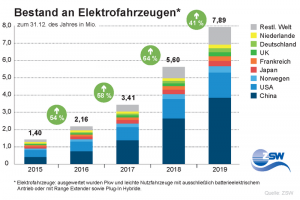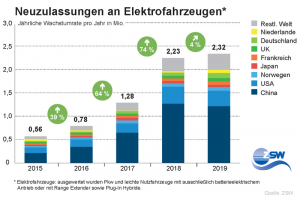 More new registrations, growth rate weakened / German manufacturers in 5th and 6th place
More new registrations, growth rate weakened / German manufacturers in 5th and 6th place
In 2019, the number of electric cars worldwide rose to around 7.9 million - an increase of 2.3 million compared to the previous year. The number of new registrations once again reached an all-time high, but grew only slightly compared to 2018. With a total of 3.8 million e-cars, China remains the undisputed global leader. It is followed by the USA with just under 1.5 million. The growth rate of new registrations declined in these two countries in particular. In Germany, on the other hand, the market continued to develop positively, albeit at a lower level: here, just under 231,000 electric vehicles were rolling along the roads at the end of 2019. The new figures come from a recent survey by the Centre for Solar Energy and Hydrogen Research Baden-Württemberg (ZSW). According to the researchers, Tesla recorded the most new registrations worldwide in 2019, with 361,000. German manufacturers continued to improve on the previous year: BMW is in fifth place worldwide with 114,500 electric cars. VW reaches sixth place.
New vehicle registrations have reached a new high of 2.3 million worldwide in 2019. However, the global growth rate compared to the previous year is only four percent, after 74 percent in the previous year. This development is due in particular to reduced subsidies for battery-electric vehicles in China and the USA. Nevertheless, the previous year's level of new registrations was almost reached in these countries: 1,204,000 new registrations were registered in the Middle Kingdom (minus 52,000), and 329,500 in the USA (minus 31,800).
Germany now in third place globally - in terms of new registrations
 In Germany, the growth in new registrations continued to rise against the international trend - from 24 percent in the previous year to 61 percent. With 108,600 newly registered electric cars, Germany is now in third place worldwide, one place better than last year. Norway follows in fourth place. New registrations there amounted to 81,540.
In Germany, the growth in new registrations continued to rise against the international trend - from 24 percent in the previous year to 61 percent. With 108,600 newly registered electric cars, Germany is now in third place worldwide, one place better than last year. Norway follows in fourth place. New registrations there amounted to 81,540.
A different picture emerges in the shares of total new passenger car registrations. In Norway, more than one in two new passenger cars, 57 percent, is electric. This is the best figure in the world. By comparison, electric cars account for three percent of new registrations in Germany, five percent in China and two percent in the USA.
Looking at the stock figures, after China and the USA comes Norway with 370,800 e-vehicles. Japan is in fourth place with around 300,000, followed by France with 274,100 and the United Kingdom with 235,700. Germany is in seventh place with 230,700 electric vehicles - also an improvement of one place compared to the previous year.
"Although the growth rate of new registrations of electric vehicles in Germany is relatively high, the market is still moving at too low a level," says Prof. Dr. Frithjof Staiß, executive board member of the ZSW. "For the German government's goal - a stock of seven to ten million electric vehicles by 2030 - there needs to be significantly more movement in development."
|
How many electric cars are there in Baden-Württemberg? With around 17,500 electric vehicles in 2019, the southwest has a 16 percent share of new registrations in Germany. Compared to 2018, the number of new registrations increased by 55 percent. The share of the Germany-wide stock is currently 19 percent. A total of 44,130 electric cars are rolling along the roads in Baden-Württemberg. Around 13 percent of Germany's population lives in the southwestern state. |
|---|
Two German manufacturers in the top 10 - Tesla number 1
In terms of cumulative new registrations, Tesla leads the way with over 875,000 electric cars. The Chinese manufacturers BYD (around 737,000) and BAIC (480,000) follow in second and third place. Two German companies are in fifth and sixth place: BMW (398,000) and VW (351,000).
Tesla is also the undisputed leader in terms of new registrations in 2019, with 361,000. It is followed by BYD (219,000), BAIC (158,000) and SAIC (126,000) - all three are Chinese companies. BMW and VW also rank fifth (115,000) and sixth (93,000) here. The gap to the world leaders is thus clear: Tesla's new registrations are much larger in total than those of BMW and VW together.
Tesla is also ahead in 2019 models
Tesla's Model 3 takes the top spot in terms of cumulative new registrations after less than three full years of sales: 445,000 registered units. The Nissan Leaf and Tesla Model S, which were the most registered models in the previous year, follow with 434,000 and 281,000 respectively. The only German model in the top 10 for cumulative new registrations is the BMW i3 with over 155,000 registrations.
Tesla's Model 3 is also well ahead in 2019 new registrations with 297,000. BAIC EU-Series (111,000) and BYD Yuan (68,000) follow at a great distance. The best German result was achieved by the plug-in hybrids of the BMW 5 Series with 46,000 models sold (sixth place). Overall, it is noticeable that seven out of ten models in the top 10 of new registrations are purely battery-electric models.
If we focus exclusively on the German market for new registrations, a different picture emerges compared to the global figures: The Renault Zoe continues to hold first place with 9,430 units. Close behind are the BMW i3 (9,380 - the battery-electric and range extender variants are added here) and the Model 3 from Tesla (9,010).
"The figures show that despite individual successes, broader efforts are needed by German manufacturers to keep up with the world leaders," Staiß said. "Market success for the announced e-models is essential for the German automotive industry." That could also avoid billions in fines for German automakers: From 2021, hefty fines will be due if the fleet of vehicles sold emits too much CO₂ on average. These funds could instead be used for investments and value creation in Germany - for example, for in-house battery cell production.
Data basis: Vehicles that fill up with electricity
For the present evaluation, passenger cars and light commercial vehicles with exclusively battery-electric drive or with a range extender as well as plug-in hybrids were included, i.e. all vehicles that can be charged externally. Therefore, so-called full hybrid vehicles, which can drive electrically over shorter distances with a comparatively small battery but cannot be charged externally, as well as mild hybrid vehicles and vehicles with fuel cells were not included. The evaluation is based, among other things, on data from the Federal Motor Transport Authority and international authorities and associations.
While the number of electric vehicles worldwide could be recorded on a country-specific basis for the existing fleet and new registrations, corresponding data differentiated by manufacturer and model is not available globally. For this reason, the evaluation by manufacturer and model is based on new registration data from the 18 largest electromobility markets. The ZSW data thus represent a conservative calculation of the actual development. In addition, since there is no globally available data on registered electric cars by manufacturer and model, the formulation "cumulative new registrations" is used.
Source: ZSW-PM from 26 February 2020
Keywords: Procurement, DE-News, New books and studies, News Blog Europe (without DE), eMobility



